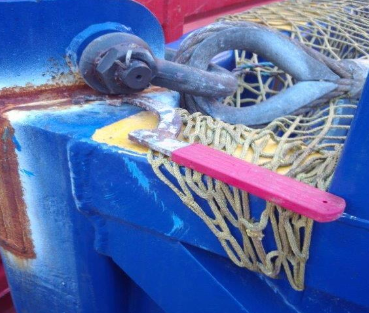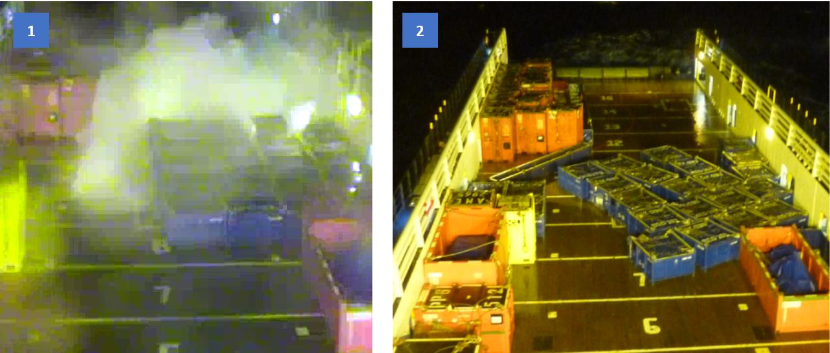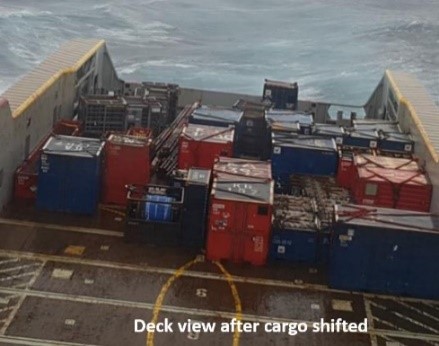MSF: three potential near misses during cargo operations
Three recent safety alerts have been released by the MSF, all relating to high potential near misses during cargo operations. One of the incidents is a dropped object near miss and two relate to cargo moving on deck.
- Safety alert 18-15: Potential Dropped Object

During deck cargo operations at an offshore installation, as a container was received on the installation landing platform the crane operator reported that a potential dropped object had been discovered on top of the container. The object was discovered to be from the supply vessel; the previous day, the supply vessel crew had conducted a fire training drill, which included rigging hoses on the main deck amongst the deck cargo. A lapse in attention by the individual using the tool and a failure in the post-work inspection meant that the tool was left on top of the container on completion of the fire exercise. The photographs show that this object was both conspicuous (red handle against blue coloured container) in appearance and left in a conspicuous position on the container. The object ought to have been discovered and removed post exercise.
- Safety alert 18-13: Cargo Shifted on Deck – High Potential Near Miss

Unsecured cargo, including a 24′ basket and 20 mud skips, shifted across the deck when a wave, significantly larger than forecast, passed the vessel. The vessel had been alongside a platform working cargo earlier in the day, but owing to the deteriorating weather conditions, the vessel ceased work and departed the 500m zone. The cargo was unsecured to facilitate cargo operations, and was not re-secured on departing the 500m zone. As conditions improved (to Force 6, 2.5m seas) preparation was made for re-entry to the 500m zone, and at this point, the large wave struck.
- Safety alert 18-14: Deck Cargo Shifted – High Potential Near Miss

A wave struck the stern of a platform supply vessel (PSV) and caused the cargo to move. The incident occurred whilst the PSV was working both stern to weather and stern towards the rig. Wind was 19 m/s and there was a significant wave height of 3.2m. As the cargo operation was about to start, a large wave hit the stern of the ship and water came over the deck. This resulted in shifting cargo; one crew member was located on the deck in an unsafe position, close to the containers. No personal injuries resulted.
Safety Event
Published: 22 June 2018
Download: IMCA SF 13/18
IMCA Safety Flashes
Submit a Report
IMCA Safety Flashes summarise key safety matters and incidents, allowing lessons to be more easily learnt for the benefit of all. The effectiveness of the IMCA Safety Flash system depends on Members sharing information and so avoiding repeat incidents. Please consider adding safetyreports@imca-int.com to your internal distribution list for safety alerts or manually submitting information on incidents you consider may be relevant. All information is anonymised or sanitised, as appropriate.
IMCA’s store terms and conditions (https://www.imca-int.com/legal-notices/terms/) apply to all downloads from IMCA’s website, including this document.
IMCA makes every effort to ensure the accuracy and reliability of the data contained in the documents it publishes, but IMCA shall not be liable for any guidance and/or recommendation and/or statement herein contained. The information contained in this document does not fulfil or replace any individual’s or Member's legal, regulatory or other duties or obligations in respect of their operations. Individuals and Members remain solely responsible for the safe, lawful and proper conduct of their operations.
